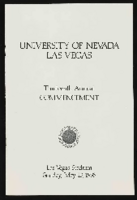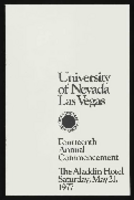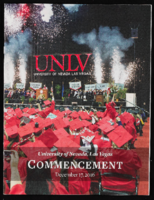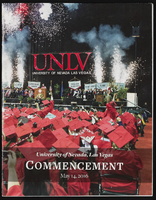Search the Special Collections and Archives Portal
Search Results

University of Nevada, Las Vegas (UNLV) Spring 2017 commencement program
Date
Archival Collection
Description
Commencement program from University of Nevada, Las Vegas Commencement Programs and Graduation Lists (UA-00115).
Text
Maurine and Fred Wilson and William S. Park Audiovisual Collection
Identifier
Abstract
The Maurine and Fred Wilson and Dr. William S. Park Audiovisual Collection (approximately 1900s-1970s) consist of audiovisual material created by the Wilson and Park families. The materials depict the Park homes in Las Vegas, Nevada; Park and Wilson family members; outdoor activities and vacation trips to California, Colorado, and Mexico. The collection also documents early views of the Kiel Ranch in Las Vegas, Nevada, community parades and events, and early views of Las Vegas in the 1920s.
Archival Collection
UNLV Libraries Collection of Project Faultless Photographs
Identifier
Abstract
The UNLV Libraries Collection of Project Faultless Photographs (1967 August 08-1968 February) contain black-and-white photographic prints of Project Faultness, a megaton nuclear test site in the Mojave Desert within Nye County, Nevada. The photographs depict scenes near and at the test site; buildings; and the area post-detonation.
Archival Collection

University of Nevada, Las Vegas (UNLV) 13th commencement program
Date
Archival Collection
Description
Commencement program from University of Nevada, Las Vegas Commencement Programs and Graduation Lists (UA-00115).
Text

University of Nevada, Las Vegas (UNLV) 14th commencement program
Date
Archival Collection
Description
Commencement program from University of Nevada, Las Vegas Commencement Programs and Graduation Lists (UA-00115).
Text

University of Nevada, Las Vegas (UNLV) Fall 2016 commencement program
Date
Archival Collection
Description
Commencement program from University of Nevada, Las Vegas Commencement Programs and Graduation Lists (UA-00115).
Text

University of Nevada, Las Vegas (UNLV) Spring 2016 commencement program
Date
Archival Collection
Description
Commencement program from University of Nevada, Las Vegas Commencement Programs and Graduation Lists (UA-00115).
Text

University of Nevada, Las Vegas (UNLV) 30th commencement program
Date
Archival Collection
Description
Commencement program from University of Nevada, Las Vegas Commencement Programs and Graduation Lists (UA-00115).
Text

University of Nevada, Las Vegas (UNLV) Spring 2021 commencement program
Date
Archival Collection
Description
Commencement program from University of Nevada, Las Vegas Commencement Programs and Graduation Lists (UA-00115).
Text
